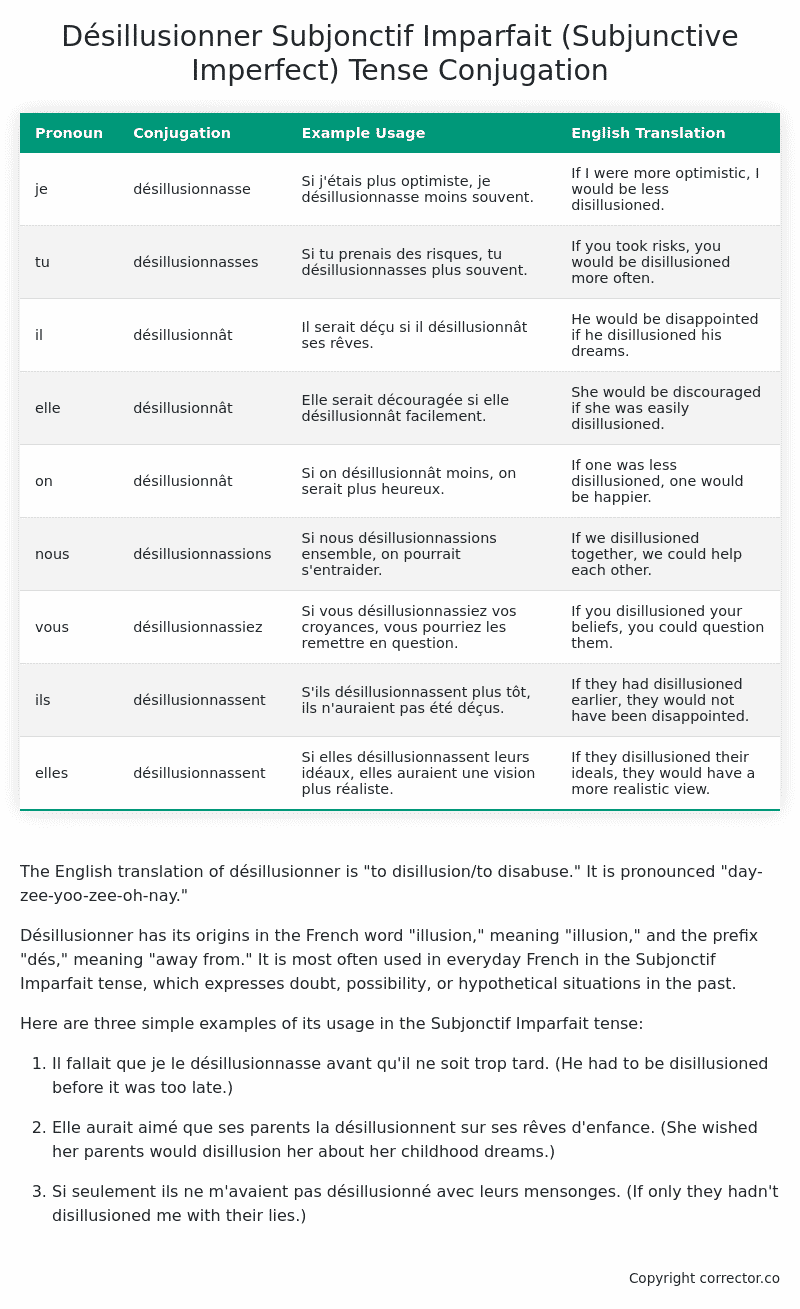Subjonctif Imparfait (Subjunctive Imperfect) Tense Conjugation of the French Verb désillusionner
Introduction to the verb désillusionner
The English translation of désillusionner is “to disillusion/to disabuse.” It is pronounced “day-zee-yoo-zee-oh-nay.”
Désillusionner has its origins in the French word “illusion,” meaning “illusion,” and the prefix “dés,” meaning “away from.” It is most often used in everyday French in the Subjonctif Imparfait tense, which expresses doubt, possibility, or hypothetical situations in the past.
Here are three simple examples of its usage in the Subjonctif Imparfait tense:
-
Il fallait que je le désillusionnasse avant qu’il ne soit trop tard.
(He had to be disillusioned before it was too late.) -
Elle aurait aimé que ses parents la désillusionnent sur ses rêves d’enfance.
(She wished her parents would disillusion her about her childhood dreams.) -
Si seulement ils ne m’avaient pas désillusionné avec leurs mensonges.
(If only they hadn’t disillusioned me with their lies.)
Table of the Subjonctif Imparfait (Subjunctive Imperfect) Tense Conjugation of désillusionner
| Pronoun | Conjugation | Example Usage | English Translation |
|---|---|---|---|
| je | désillusionnasse | Si j’étais plus optimiste, je désillusionnasse moins souvent. | If I were more optimistic, I would be less disillusioned. |
| tu | désillusionnasses | Si tu prenais des risques, tu désillusionnasses plus souvent. | If you took risks, you would be disillusioned more often. |
| il | désillusionnât | Il serait déçu si il désillusionnât ses rêves. | He would be disappointed if he disillusioned his dreams. |
| elle | désillusionnât | Elle serait découragée si elle désillusionnât facilement. | She would be discouraged if she was easily disillusioned. |
| on | désillusionnât | Si on désillusionnât moins, on serait plus heureux. | If one was less disillusioned, one would be happier. |
| nous | désillusionnassions | Si nous désillusionnassions ensemble, on pourrait s’entraider. | If we disillusioned together, we could help each other. |
| vous | désillusionnassiez | Si vous désillusionnassiez vos croyances, vous pourriez les remettre en question. | If you disillusioned your beliefs, you could question them. |
| ils | désillusionnassent | S’ils désillusionnassent plus tôt, ils n’auraient pas été déçus. | If they had disillusioned earlier, they would not have been disappointed. |
| elles | désillusionnassent | Si elles désillusionnassent leurs idéaux, elles auraient une vision plus réaliste. | If they disillusioned their ideals, they would have a more realistic view. |
Other Conjugations for Désillusionner.
Le Present (Present Tense) Conjugation of the French Verb désillusionner
Imparfait (Imperfect) Tense Conjugation of the French Verb désillusionner
Passé Simple (Simple Past) Tense Conjugation of the French Verb désillusionner
Passé Composé (Present Perfect) Tense Conjugation of the French Verb désillusionner
Futur Simple (Simple Future) Tense Conjugation of the French Verb désillusionner
Futur Proche (Near Future) Tense Conjugation of the French Verb désillusionner
Plus-que-parfait (Pluperfect) Tense Conjugation of the French Verb désillusionner
Passé Antérieur (Past Anterior) Tense Conjugation of the French Verb désillusionner
Futur Antérieur (Future Anterior) Tense Conjugation of the French Verb désillusionner
Subjonctif Présent (Subjunctive Present) Tense Conjugation of the French Verb désillusionner
Subjonctif Passé (Subjunctive Past) Tense Conjugation of the French Verb désillusionner
Subjonctif Imparfait (Subjunctive Imperfect) Tense Conjugation of the French Verb désillusionner (this article)
Conditionnel Présent (Conditional Present) Tense Conjugation of the French Verb désillusionner
Conditionnel Passé (Conditional Past) Tense Conjugation of the French Verb désillusionner
L’impératif Présent (Imperative Present) Tense Conjugation of the French Verb désillusionner
L’infinitif Présent (Infinitive Present) Tense Conjugation of the French Verb désillusionner
Struggling with French verbs or the language in general? Why not use our free French Grammar Checker – no registration required!
Get a FREE Download Study Sheet of this Conjugation 🔥
Simply right click the image below, click “save image” and get your free reference for the désillusionner Subjonctif Imparfait tense conjugation!

Désillusionner – About the French Subjonctif Imparfait (Subjunctive Imperfect) Tense
Formation
Common Everyday Usage Patterns
Interactions with Other Tenses
Subjonctif Présent
Indicatif Passé Composé
Conditional
Conditional Perfect
Summary
I hope you enjoyed this article on the verb désillusionner. Still in a learning mood? Check out another TOTALLY random French verb conjugation!


